Welcome to the April 2017 issue of the Global Washington newsletter.
IN THIS ISSUE
- Letter from Our Executive Director
- Issue Brief: Coffee: The Future of Coffee Farming in a Changing Climate
- Featured Organization: Seattle University
- Changemaker: Nathalia Rodriguez Vega, Global Partnerships
- Welcome New Members
- GlobalWA Member Events
- Career Center
- GlobalWA Events
Letter from our Executive Director
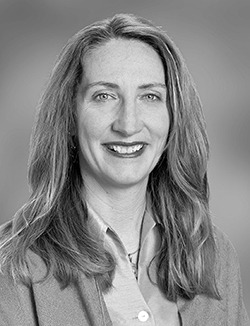
This week, some 12,000 coffee professionals will filter through Seattle for the annual Global Specialty Coffee Expo. Baristas will be competing for the best latte design, participants will learn about the science of coffee, and hundreds of exhibitors will be marketing specialty coffee products. Alongside this Expo, Global Washington will be shining the spotlight on coffee growers in developing countries who bring that delicious brew to our cup each day.
We’ve been pouring over the research, and one thing we’ve learned is that it can be challenging to be a coffee farmer, and climate change is increasing some of the perennial hardships farmers face. Many are having to explore new planting and irrigation techniques, even switching to new types of coffee plants, or new crops altogether.
Several non-profit organizations and academic institutions in Washington state work with coffee farmers to create a more equitable and environmentally sustainable coffee supply chain. In this month’s issue brief, you can learn more about some of the programs that Global Washington members have percolating in coffee-growing regions. Our member profile this month looks at how a Seattle University class project with coffee farmers turned into a student-run social enterprise, Café Ambiental. And our Changemaker for April is a woman from Colombia who is living out her grandfather’s legacy by serving up financial access for coffee farmers through Global Partnerships.
Here in Seattle, we’re known for our great coffee. I hope that after learning more about smallholder coffee farmers around the world, and the Global Washington members working to improve their lives and livelihoods, you will be even more proud of our region and our reputation for supporting excellent, equitable coffee.

Kristen Dailey
Executive Director
Issue Brief
The Future of Coffee Farming in a Changing Climate
By Erika Koss
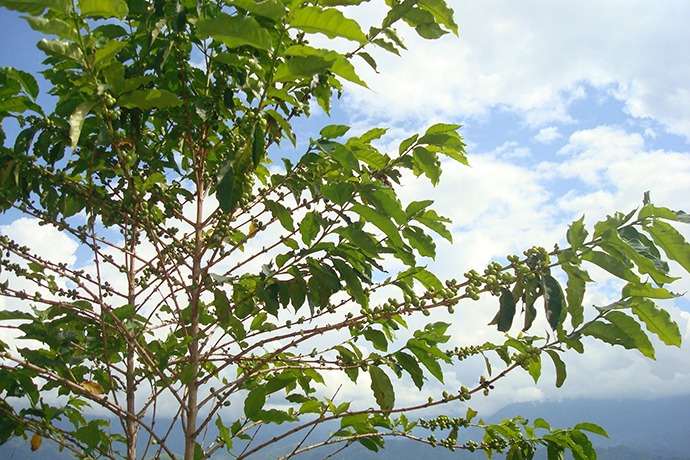
Arabica coffee tree in Uganda. (Credit: Erika Koss).
“The Emerald City” is a fitting nickname for Seattle, a city filled with beauty: parks, lakes, and dazzling views of Mt. Rainer. But it’s also a jewel as a global center of environmental stewardship and social innovation. With a robust Climate Action Plan, intended to achieve carbon neutrality by 2050, it’s also a hub for innovation in technology, science, and the arts. And, Seattle is arguably the “coffee capital” of the United States, a seaport city with a deep history of coffee trade and economic growth, which now boasts more than 1,700 coffee shops to serve its more than 684,000 residents who speak more than 160 languages.
For all these reasons, Seattle is the perfect city to, once again, host the Specialty Coffee Association of America’s annual U.S. Re:Co Symposium and its newly renamed “Global Specialty Coffee Expo.” This week, these two events will unite more than 12,000 coffee professionals from around the world.
The term “specialty coffee” is only rightly applied when coffee beans can be accurately traced to their origin, and when the resulting drink is graded a score of 80 or above through cupping, a rigorous method of judging coffee quality. But specialty coffee purveyors are also driven by a quest for environmental and human sustainability at every part of a long global supply chain.
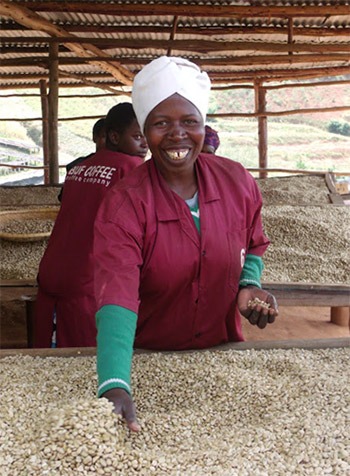
Women are essential actors throughout coffee’s global supply chain, such as this woman, who has worked for a decade at Buf Coffee’s washing stations in Rwanda. Her job includes managing the process of sorting parchment coffee that will be eventually exported to specialty coffee roasters. (Credit: Erika Koss).
The coffee supply chain is nothing if not complex. More than 25 million coffee farmers who hail from the “bean belt”—tropical countries around the equator that produce the coffee bean—work long, tiring hours in some of the world’s most beautiful countries, to grow a product ultimately consumed by more than 80% of all adults in the Global North. Among the 75 coffee-producing countries, the top five producers in 2016 were Brazil, Vietnam, Colombia, Indonesia, and Ethiopia. The vast majority of the world’s coffee is consumed by the European Union countries and in the United States, where demand for coffee has been rising for the last two decades. But it’s mostly in Scandinavia—where many workers’ unions require coffee breaks—that per capita consumption reigns.
At the Global Specialty Coffee Expo, members will join in promoting and enjoying coffee, as well as discussing various challenges that the industry faces, including the greatest one, climate change. Many have even been asking, will we have coffee in 80 years? In 50 years? In 30?
And, like so much in coffee, the answer is, it depends.
If you ask the researchers of the U.K.’s Royal Botanic Gardens and the Environment and Coffee Forest Forum in Ethiopia, we have until 2080 before a majority of the world’s coffee supply disappears due to climate change.
Perhaps one of the most ominous predictions comes from World Coffee Research, which estimates that half of the land currently suitable for Arabica coffee production will no longer be suitable by 2050.
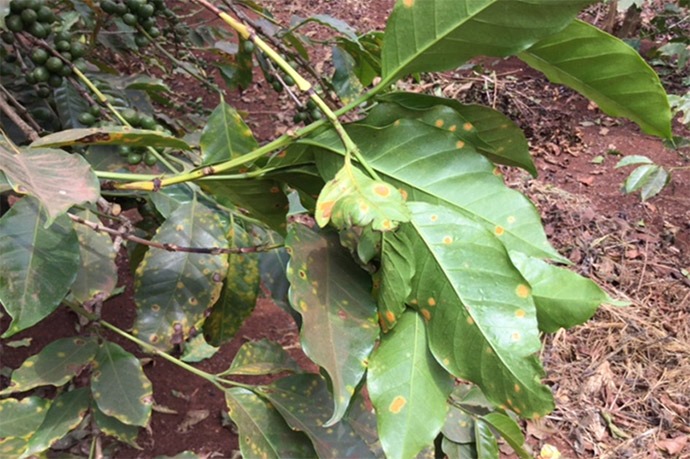
“Coffee rust” (la roya) infects this coffee tree in Kenya, destroying its capacity to produce healthy cherries. (Credit: Erika Koss).
Even the United Nations is concerned. In the Intergovernmental Panel on Climate Change’s 2014 synthesis report, the authors predict that throughout the 21st century, “heat waves will occur more often and last longer, and that extreme precipitation events will become more intense and frequent.” This poses a serious threat for coffee since the tree requires consistent sunlight for photosynthesis, as well as cool temperatures that won’t parch its cherries.
The increasing temperatures also increase the spread of coffee-related diseases and pests that vex coffee farmers and their communities in Latin America, East Africa, and Asia:
- Coffee diseases: “coffee rust” or la roya – a fungus that attacks the leaf and destroys the branch (and therefore the coffee cherry);
- Coffee pests: “coffee berry borer” – an adult female beetle that “bores” a tiny tunnel into the coffee cherry to lay her eggs. When hatched, the larvae feed upon the coffee cherry, thereby ruining its possibility for production;
- Coffee defects: “the Potato Cup” – a defect only traced through taste in the cup, after all the hard labor and time has already gone into the cherry and bean’s production.
Most coffee producers are small-holder farmers, those who own about 25 acres of land or less. Due to coffee’s volatile prices and trade regulations, farmers have a hard time gaining stability unless they join with non-profit certifiers, such as Fair Trade USA, that provide a floor price. Add to this challenge that of labor scarcity. Coffee farmers are aging out, and youth often migrate to cities, where they can earn more for their labor. Since there aren’t enough hands to pick cherries and produce coffee, a coffee lover might well wonder: what hope is left?
Certainly the scientists are hard at work researching more resilient coffee seeds, trees, and beans. And some roasters and café owners implement sustainable business practices by using compostable bags, recyclable coffee lids, or renewable energy. But mitigating climate change will take much more than this.
Thankfully, the entire coffee community is working on these and other challenges —diligently, devotedly, compassionately. That’s why they’re coming to Seattle from all corners of the globe to share with us their passion for the bean – and the people who produce it.
* * *
By strengthening the economic, social and environmental sustainability of coffee production, various Global Washington members are building stronger communities and ensuring the future of a product none of us wants to go without.
Agros International’s data shows that coffee production is a key element of the success and profitability for poor families. That is why Agros’ intervention strategy does not solely focus on its production, but in its commercialization. Farmers receive technical assistance and quality inputs, while Agros makes strategic investments in processing as well on site support to guarantee compliance with both market and environmental standards. The final step is for Agros to create a linkage to consumers by formally connecting farmers to exporters. Coffee rust and the recent drought plagued Agros families along with other coffee farmers in Central America. The response from Agros was to plant roya resistant plants and to enhance irrigation systems in their seven active communities, along with further encouragement of crop diversification. Harvesting coffee is just a piece of an overarching strategy to move families along Agros’ Theory of Change, called the “Path to Prosperity.” A wide-range of other crops for consumption and sale also play a role, along with community development, education, health and emotional growth for each community member.
Global Partnerships is an impact-led investor whose mission is to expand opportunity for people living in poverty. The organization invests in social enterprise partners who empower people to earn a living and improve their lives. Over the last 23 years, Global Partnerships has impacted over 5.1 million lives in 15 countries across Latin America, the Caribbean and sub-Saharan Africa as a result of our impact investments in 101 partners. Partners include agricultural businesses and cooperatives that help smallholder coffee farmers increase their income and strengthen their economic well-being. These partners deliver improved market access, technical assistance and working capital loans designed to help farmers improve crop quality, increase yields, obtain better pricing for their crops, and ultimately strengthen their resilience and economic well-being. An example of these partners is Cenfrocafe, a coffee cooperative that serves 2,450 smallholder coffee farmers in Northern Peru. Cenfrocafe has full-time staff dedicated to providing technical assistance and all of their clients are Fair Trade certified. Their clients earn an estimated $6.53 per day, per family member.
Oxfam America focuses on tackling the conditions that cause poverty by advocating for new laws to help the world’s poor and offering direct support to impoverished people. Throughout the years, Oxfam has supported coffee farmers and raised awareness of the importance of Fair Trade. As global coffee prices have fallen, Oxfam has supported coffee farmers in their fight for fair treatment and better wages. Oxfam’s advocacy efforts include meeting with coffee corporations to push them to adopt fair business practices, providing farmers with new technologies and necessary supplies, and raising awareness of the importance of Fair Trade.
Seattle University was the first Fair Trade University in the Pacific Northwest. As part of the University’s journey to garner Fair Trade certification, a professor collaborated with students and colleagues at the Universidad Centroamericana Managua (SU’s sister school) to develop a new fair trade coffee. In partnership with farmers in the Nicaraguan coffee farmer cooperative CECOSEMAC, the sisters schools worked together to develop Café Ambiental, which is now sold by SU. SU has completed various other projects in conjunction with coffee growers in Nicaragua, including developing a more efficient and sustainable way to treat coffee wastewater.
Theo Chocolate is the first Organic, Fair Trade and Fair for Life chocolate factory in North America. Theo believes that chocolate can and must be produced in a way that creates long-term sustainability for the farmers, the planet, and the consumers. To further that mission, all of Theo’s ingredients, not just its cocoa, are certified organic and fair trade. Theo’s Coffee and Cream milk chocolate bar and coffee caramels both contain organic coffee from local roaster Café Vita.
Thriive’s mission is building shared prosperity in vulnerable, global communities. We achieve our mission by making pay-it-forward loans of up to $10,000 to ambitious small business entrepreneurs to grow their businesses and create desperately needed jobs. Unlike a bank or microfinance loan, ThriiveCapital loans are not repaid in cash, but by business donations of an equivalent value of job training, income-enhancing products, or basic necessities to disadvantaged community members. Thriive supports many different types of businesses including coffee manufacturers in Nicaragua, Guatemala, Kenya, and Vietnam. An example is De La Finca in Nicaragua. De La Finca produces, processes, and distributes its own gourmet honey and coffee products. Their ThriiveCapital loan purchased new equipment to grow and expand their coffee shop. De La Finca’s charitable repayment is highly beneficial to the local community- training unemployed single mothers and unemployed college students in coffee production and processing. Trainees then have the opportunity to sell De La Finca products on their own and keep the income. So far, De La Finca has increased their revenue by 101%, created 2 fulltime jobs, and trained 35 individuals!
Woodland Park Zoo supports a variety of environmentally sustainable projects. Since 1996, the Zoo’s Tree Kangaroo Conservation Program (TKCP) has worked with the communities of Yopno-Uruwa-Som (YUS) to protect the endangered tree kangaroo and its rainforest habitat in Papua New Guinea. In 2009, TKCP partnered with the indigenous YUS landowners to help them address economic challenges. Through an existing relationship between the Zoo and Seattle-based coffee roaster Caffe Vita, TKCP and the people of YUS began to sell Conservation Coffee on the international market. The coffee is shade-grown in small, sustainable family gardens, flown out of the remote mountain villages, and sold by farmers directly to Caffe Vita and other international buyers. To date, farmers have exported more than 65 tons of YUS Conservation Coffee. The success of the program encourages other landowners to pledge their land for conservation. More land pledges means more protection for species such as the tree kangaroo.
Featured Organization: Seattle University
Seattle University Students Brew Up a Fairer Fair Trade Coffee
By Andie Long
Despite both economic and ecological challenges, Seattle University students are supporting Nicaraguan farmers in their commitment to produce the highest quality coffee – and you can get it right here in Seattle.
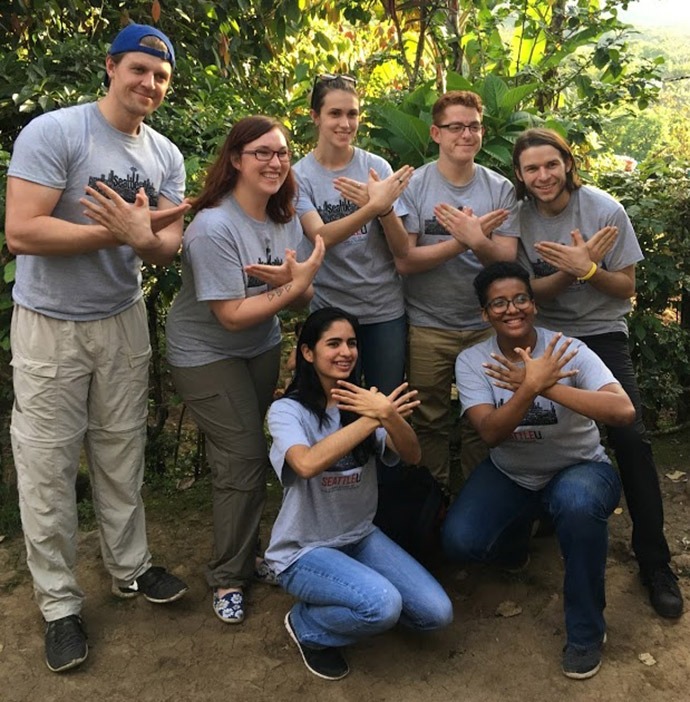
The fair trade coffee team at Seattle University, making the official SU Redhawk sign.
Back row: Justin Totura, Samantha Henry, Lucy Wilhelm, Braden Wild, Benjamin Fuller. Front row: two students from the University of Central America-Managua, Javiera Maritza Alfaro Salinas and Agustina Zamora. (Credit: Seattle University).
For nearly a decade and a half, Seattle University students and faculty have partnered with a coffee cooperative in Matagalpa, Nicaragua. Visiting the farms and talking to some of the 300 smallholder farmers who form the co-op CECOSEMAC, whose acronym means “Aroma of Coffee” Union of Multiple-Service Cooperatives, students have learned about the challenges that coffee farmers face, and worked with them to find ways to solve them.
The relationship with the Nicaraguan coffee co-op began in 2003 when Seattle University chemistry professor, Dr. Susan Jackels, along with Professor Carlos Vallejos and his students from the Universidad Centroamericana Managua, began researching ways to improve the quality of coffee for smallholder farmers after the coffee crisis. Today the program has two faculty advisors besides Jackels, including Dr. Nathan Colaner, who teaches business ethics, and Dr. Quan Le, who teaches international economics.
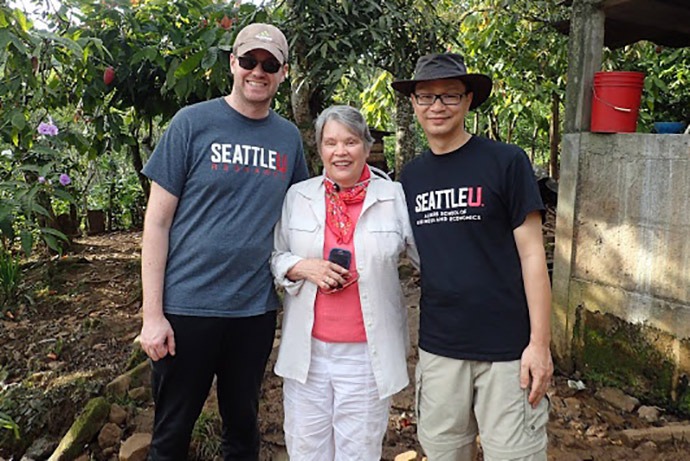
Seattle University faculty advisors: Nathan Colaner (Business Ethics), Sue Jackels (Chemistry), Quan Le (Economics). (Credit: Seattle University).
Since 2003, multiple student projects have sprung up. In 2015, when Professor Le and his students travelled to Nicaragua to visit the coffee co-op, they were joined by a student engineering team, led by Professor Mike Marsolek and professional engineers from Seattle University Department of Civil and Environmental Engineering. The engineering students were working on a wastewater treatment project, while the business students had decided to start a service-learning project, which came to be known as More than Fair Trade.
Le’s students had learned that organic cultivation methods and other fair trade certification requirements tended to decrease the amount of coffee that farmers could produce. Even though farmers could charge a slightly higher price for the resulting product, it still left them without much leftover at the end of the harvest. As a result, the students vowed to find a way to purchase fair trade coffee from the co-op at a price that would not only provide a premium for the certified organic coffee, but would also compensate farmers for the shortfall in their yields, so that they would be able to continue to invest in their farms and their communities.
The business model the group decided on was to pay the farmers a premium 25-35% higher for organic coffee than what they would normally receive, and they would pay up front for every order. The hope was that the pricing mechanism would give farmers incentive to continue improving the quality of their coffee. Sure enough, this is what happened.
The 2017 cupping, the process by which coffee quality is judged, resulted in an almost two point increase compared with where the product was at two years ago. Not only that, all of the profits from the coffee that the students purchased and sold at Seattle University went back to the farmers in the form of school scholarships to support their children.
Coffee farmers in Matagalpa are working hard to improve the quality of their coffee in order to have their product accepted by the specialty coffee market. A greater challenge, however, may be how they can adapt their current agricultural practices in response to climate change.
According to Le, Nicaragua traditionally grows Arabica coffee, which is considered the highest quality and highest prestige. In the past few years, however, the Nicaraguan government has been encouraging farmers to grow Robusta coffee, as it is more tolerant to drought and better suited to the changing climate. Robusta also produces a higher yield and at lower cost. Nevertheless, Le says none of the farmers in the co-op that Seattle University works with are considering switching to Robusta. Not yet, anyway. For now, they are committed to raising the quality of their coffee on the international market, despite the lower yields.
One way the farmers are managing their risk, however, is by working with international organizations, such as the Latin American and Caribbean Network of Fair Trade Small Producers and Workers, to improve their soil management. They are also receiving assistance from a group in the Netherlands on how to improve the quality of their coffee, while at the same time reducing any environmental damage.
For several years, the Seattle University bookstore has been selling the Nicaraguan co-op’s certified organic, fair trade coffee. In March of this year, the students incorporated the project as a student-run social enterprise, called Café Ambiental (Environmental Coffee). It is the only student run business at Seattle University.
Sold for $12.95 per bag, $1.60 from every purchase goes directly to the co-op farmers above what they would normally get, and an additional $3.50 goes towards an education fund for the farmworkers’ children. The profit made from the sales is then used to buy more coffee.
“With the establishment of Café Ambiental, the students are now looking to grow the business beyond Seattle University, so that they might send more money back to the farmers,” said Le. “Hopefully the community will support their endeavors.”
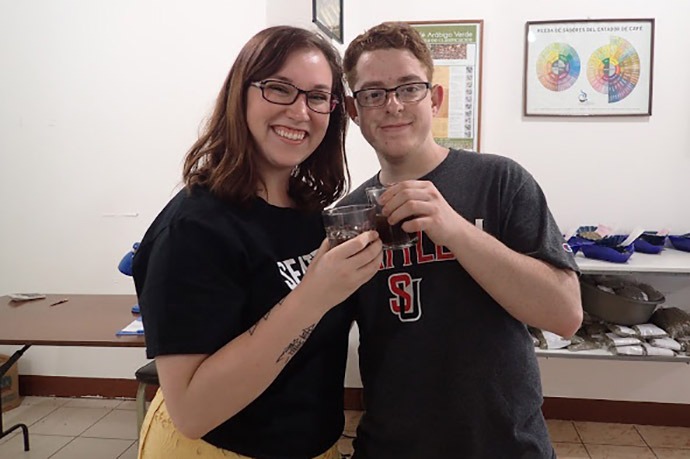
Seattle University student leaders of Café Ambiental: Samantha Henry, VP of Marketing, and Braden Wild, CEO. (Credit: Seattle University).
Changemaker
Nathalia Rodriguez Vega, Global Partnerships
By Andie Long
Global Partnerships’ Nathalia Rodriguez Vega draws on her Colombian heritage in helping coffee-growers lift themselves out of poverty
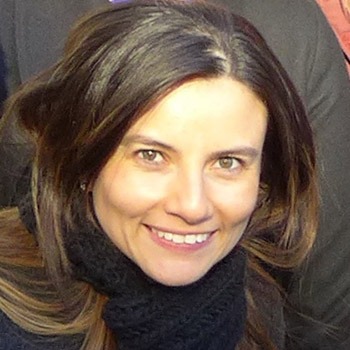
Nathalia Rodriguez Vega, VP Portfolio Monitoring & Economic Analysis, Global Partnerships. (Credit: Global Partnerships).
Growing up in Bogota, Colombia, Nathalia remembers her mom telling stories about her grandfather, Luis Felipe Vega, who managed a coffee farm on the north coast. He started a coffee cooperative so that he and the other farmers in the area could secure a higher price for their beans. Though she never met her grandfather, Nathalia feels a strong connection to his legacy, including working to help improve opportunity for people who grow coffee for a living.
After studying economics and working for a number of years at a major bank in the United States, Nathalia felt a nagging desire to do more with her financial skills to help people, like the farmers her grandfather knew, lift themselves out of poverty. Her search brought her to an emerging field, “impact investing,” a specialty of Seattle-based Global Partnerships.
Living in Seattle for the past five years, Nathalia helps manage Global Partnerships’ debt funds, which invest in social enterprise partners in Latin America, the Caribbean and Sub-Saharan Africa. Less than 10 percent of their partners are coffee-related, yet these partners are currently serving more than 30,000 thousand coffee farmers.
Around 70 percent of all the coffee globally is produced by smallholder farmers, and one of the greatest risks these farmers face is the impact of climate change on their crops. Leaf rust, for example, a fungus that can devastate coffee trees, has been increasing in range and frequency as a result of steadily warming temperatures. In addition, coffee farmers have been grappling with excessive amounts of rain in some areas, and historic low rainfall in other areas. Overall, the extremes are becoming harder to manage.
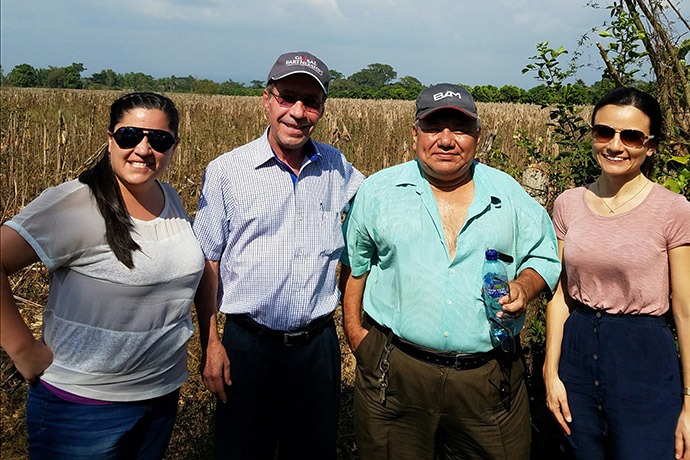
Nathalia Rodriguez Vega (far right) with her Global Partnerships colleagues in Guatemala. (Credit: Global Partnerships).
As a perennial plant, coffee trees are highly sensitive to changes in the environment. Farmers have been experimenting with various ways to adapt their crop to rapidly changing conditions; some are even planting new varieties or switching crops altogether. Requirements of certification groups, such as Fair Trade USA and the Rainforest Alliance, have had the added benefit of making coffee farms (and thus, farmers) more resilient to some of the effects of climate change. These include shifting to new methods of irrigation, pesticide use, and even waste management.
The investment process that Nathalia follows at Global Partnerships includes verifying that the coffee-related service groups they fund are providing farmers with high impact products and services, such as access to international markets, technical assistance, and affordable loans to expand their coffee businesses. Coffee plants start to bear fruit around year three, and reach their full production after year five. Yields start to decline after eight to 10 years, depending on the investment in ongoing maintenance. As a result, farmers must seek funding to “renovate” their crops, especially since aging trees are even more susceptible to weather shocks.
Nathalia sees an incredible richness and vibrancy in the coffee sector here in Seattle and around the world. “It feels very much alive,” she says.
Asked how she likes to drink her coffee, Nathalia replies without hesitation, “Black, no sugar.” Colombian, of course.
Welcome New Members
Please welcome our newest Global Washington members. Take a moment to familiarize yourself with their work and consider opportunities for support and collaboration!
Global Child Nutrition Foundation
Global Child Nutrition Foundation (GCNF) expands opportunities for the world’s children to receive adequate nutrition for learning and achieving their potential. gcnf.org
Member Events
April 19: Washington Nonprofits // Central Washington Conference for the Greater Good
April 25: OutRight Action International // Rights and Resistance: Lessons from the Frontline of the Global LGBTQI Movement
May 1: University of Washington School of Law // Deadline for Sustainable International Development Program
May 1: Shoreline Community College // Saudi Arabia in Transition
May 6: Construction for Change // Banquet
May 10: Women’s Enterprises International // 9th Annual Walk for Water
May 18: One By One // Annual Dinner
June 14: Trade Development Alliance for Greater Seattle // Global Cookout
Career Center
Highlighted Positions
Office Manager, Global Washington
Senior Communications Associate with MACEPA, PATH
Hospitality Coordinator, iLEAP
Development Assistant, Splash
For more jobs and resources, visit https://globalwa.org/job-board/
GlobalWA Events
April 19: Networking Happy Hour with Friends of GlobalWA, Humanosphere and World Affairs Council